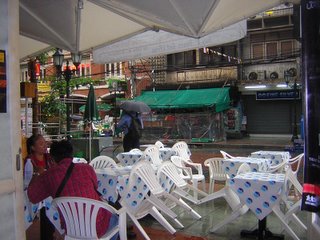This post at
'Armed and Dangerous' really gets to the heart of the matter. A bit long, but very important to me. Since I can't articulate my understanding of philosophy and politics in regards to the clash of Cold War ideology this well, I will simply reproduce it here for my readers (so many, haha- maybe a few will read this whole thing) to look over for their own edification. This is probably 95% of what I believe as far as the philosophical conflict of the modern world we face today- dealing with the attempts by opposition to undermine our legitimacy. Beginning below...
Gramscian damageAmericans have never really understood ideological warfare. Our gut-level assumption is that everybody in the world really wants the same comfortable material success we have. We use “extremist” as a negative epithetic. Even the few fanatics and revolutionary idealists we have, whatever their political flavor, expect everybody else to behave like a bourgeois.
We don’t expect ideas to matter — or, when they do, we expect them to matter only because people have been flipped into a vulnerable mode by repression or poverty. Thus all our divagation about the “root causes” of Islamic terrorism, as if the terrorists’ very clear and very ideological account of their own theory and motivations is somehow not to be believed.
By contrast, ideological and memetic warfare has been a favored tactic for all of America’s three great adversaries of the last hundred years — Nazis, Communists, and Islamists. All three put substantial effort into cultivating American proxies to influence U.S. domestic policy and foreign policy in favorable directions. Yes, the Nazis did this, through organizations like the “German-American Bund” that was outlawed when World War II went hot. Today, the Islamists are having some success at manipulating our politics through fairly transparent front organizations like the Council on American-Islamic Relations.
But it was the Soviet Union, in its day, that was the master of this game. They made dezinformatsiya (disinformation) a central weapon of their war against “the main adversary”, the U.S. They conducted memetic subversion against the U.S. on many levels at a scale that is only now becoming clear as historians burrow through their archives and ex-KGB officers sell their memoirs.
The Soviets had an entire “active measures” department devoted to churning out anti-American dezinformatsiya. A classic example is the rumor that AIDS was the result of research aimed at building a ‘race bomb’ that would selectively kill black people.
On a different level, in the 1930s members of CPUSA (the Communist Party of the USA) got instructions from Moscow to promote non-representational art so that the US’s public spaces would become arid and ugly.
Americans hearing that last one tend to laugh. But the Soviets, following the lead of Marxist theoreticians like Antonio Gramsci, took very seriously the idea that by blighting the U.S.’s intellectual and esthetic life, they could sap Americans’ will to resist Communist ideology and an eventual Communist takeover. The explicit goal was to erode the confidence of America’s ruling class and create an ideological vacuum to be filled by Marxism-Leninism.
Accordingly, the Soviet espionage apparat actually ran two different kinds of network: one of spies, and one of agents of influence. The agents of influence had the minor function of recruiting spies (as, for example, when Kim Philby was brought in by one of his tutors at Cambridge), but their major function was to spread dezinformatsiya, to launch memetic weapons that would damage and weaken the West.
In a previous post on Suicidalism, I identified some of the most important of the Soviet Union’s memetic weapons. Here is that list again:
There is no truth, only competing agendas.
All Western (and especially American) claims to moral superiority over Communism/Fascism/Islam are vitiated by the West’s history of racism and colonialism.
There are no objective standards by which we may judge one culture to be better than another. Anyone who claims that there are such standards is an evil oppressor.
The prosperity of the West is built on ruthless exploitation of the Third World; therefore Westerners actually deserve to be impoverished and miserable.
Crime is the fault of society, not the individual criminal. Poor criminals are entitled to what they take. Submitting to criminal predation is more virtuous than resisting it.
The poor are victims. Criminals are victims. And only victims are virtuous. Therefore only the poor and criminals are virtuous. (Rich people can borrow some virtue by identifying with poor people and criminals.)
For a virtuous person, violence and war are never justified. It is always better to be a victim than to fight, or even to defend oneself. But ‘oppressed’ people are allowed to use violence anyway; they are merely reflecting the evil of their oppressors.
When confronted with terror, the only moral course for a Westerner is to apologize for past sins, understand the terrorist’s point of view, and make concessions.
As I previously observed, if you trace any of these back far enough, you’ll find a Stalinist intellectual at the bottom. (The last two items on the list, for example, came to us courtesy of Frantz Fanon. The fourth item is the Baran-Wallerstein “world system” thesis.) Most were staples of Soviet propaganda at the same time they were being promoted by “progressives” (read: Marxists and the dupes of Marxists) within the Western intelligentsia.
The Soviets consciously followed the Gramscian prescription; they pursued a war of position, subverting the “leading elements” of society through their agents of influence. (See, for example, Stephen Koch’s Double Lives: Stalin, Willi Munzenberg and the Seduction of the Intellectuals; summary by Koch here) This worked exactly as expected; their memes seeped into Western popular culture and are repeated endlessly in (for example) the products of Hollywood.
Indeed, the index of Soviet success is that most of us no longer think of these memes as Communist propaganda. It takes a significant amount of digging and rethinking and remembering, even for a lifelong anti-Communist like myself, to realize that there was a time (within the lifetime of my parents) when all of these ideas would have seemed alien, absurd, and repulsive to most people — at best, the beliefs of a nutty left-wing fringe, and at worst instruments of deliberate subversion intended to destroy the American way of life.
Koch shows us that the worst-case scenario was, as it turns out now, the correct one; these ideas, like the “race bomb” rumor, really were instruments deliberately designed to destroy the American way of life. Another index of their success is that most members of the bicoastal elite can no longer speak of “the American way of life” without deprecation, irony, or an automatic and half-conscious genuflection towards the altar of political correctness. In this and other ways, the corrosive effects of Stalin’s meme war have come to utterly pervade our culture.
The most paranoid and xenophobic conservatives of the Cold War were, painful though this is to admit, the closest to the truth in estimating the magnitude and subtlety of Soviet subversion. Liberal anticommunists (like myself in the 1970s) thought we were being judicious and fair-minded when we dismissed half of the Right’s complaint as crude blather. We were wrong; the Rosenbergs and Alger Hiss really were guilty, the Hollywood Ten really were Stalinist tools, and all of Joseph McCarthy’s rants about “Communists in the State Department” were essentially true. The Venona transcripts and other new material leave no room for reasonable doubt on this score.
While the espionage apparatus of the Soviet Union didn’t outlast it, their memetic weapons did. These memes are now coming near to crippling our culture’s response to Islamic terrorism.
In this context, Jeff Goldstein has written eloquently about perhaps the most long-term dangerous of these memes — the idea that rights inhere not in sovereign individuals but identity groups, and that every identity group (except the “ruling class”) has the right to suppress criticism of itself through political means up to and including violence.
Mark Brittingham (aka WildMonk) has written an excellent essay on the roots of this doctrine in Rousseau and the post-Enlightenment Romantics. It has elsewhere been analyzed and labeled as transnational progressivism. The Soviets didn’t invent it, but they promoted it heavily in a deliberate — and appallingly successful — attempt to weaken the Lockean, individualist tradition that underlies classical liberalism and the U.S. Constitution. The reduction of Western politics to a bitter war for government favor between ascriptive identity groups is exactly the outcome the Soviets wanted and worked hard to arrange.
Call it what you will — various other commentators have favored ‘volk-Marxism’ or ‘postmodern leftism’. I’ve called it suicidalism. It was designed to paralyze the West against one enemy, but it’s now being used against us by another. It is no accident that Osama bin Laden so often sounds like he’s reading from back issues of Z magazine, and no accident that both constantly echo the hoariest old cliches of Soviet propaganda in the 1930s and ’40s.
Another consequence of Stalin’s meme war is that today’s left-wing antiwar demonstrators wear kaffiyehs without any sense of how grotesque it is for ostensible Marxists to cuddle up to religious absolutists who want to restore the power relations of the 7th century CE. In Stalin’s hands, even Marxism itself was hollowed out to serve as a memetic weapon — it became increasingly nihilist, hatred-focused and destructive. The postmodern left is now defined not by what it’s for but by by what it’s against: classical-liberal individualism, free markets, dead white males, America, and the idea of objective reality itself.
The first step to recovery is understanding the problem. Knowing that suicidalist memes were launched at us as war weapons by the espionage apparatus of the most evil despotism in human history is in itself liberating. Liberating, too, it is to realize that the Noam Chomskys and Michael Moores and Robert Fisks of the world (and their thousands of lesser imitators in faculty lounges everywhere) are not brave transgressive forward-thinkers but pathetic memebots running the program of a dead tyrant.
Brittingham and other have worried that postmodern leftism may yet win. If so, the victory would be short-lived. One of the clearest lessons of recent times (exemplified not just by kaffiyeh-wearing western leftists but by Hamas’s recent clobbering of al-Fatah in the first Palestinian elections) is that po-mo leftism is weaker than liberal individualism in one important respect; it has only the weakest defenses against absolutist fervor. Brittingham tellingly notes po-mo philosopher Richard Rorty’s realization that when the babble of conflicting tribal narratives collapses in exhaustion, the only thing left is the will to power.
Again, this is by design. Lenin and Stalin wanted classical-liberal individualism replaced with something less able to resist totalitarianism, not more. Volk-Marxist fantasy and postmodern nihilism served their purposes; the emergence of an adhesive counter-ideology would not have. Thus, the Chomskys and Moores and Fisks are running a program carefully designed to dead-end at nothing.
Religions are good at filling that kind of nothing. Accordingly, if transational progressivism actually succeeds in smothering liberal individualism, its reward will be to be put to the sword by some flavor of jihadi. Whether the eventual winners are Muslims or Mormons, the future is not going to look like the fuzzy multicultural ecotopia of modern left fantasy. The death of that dream is being written in European banlieus by angry Muslim youths under the light of burning cars.
In the banlieus and elsewhere, Islamist pressure makes it certain that sooner or later the West is going to vomit Stalin’s memes out of its body politic. The worst way would be through a reflex development of Western absolutism — Christian chauvinism, nativism and militarism melding into something like Francoite fascism. The self-panicking leftists who think they see that in today’s Republicans are comically wrong (as witnessed by the fact that they aren’t being systematically jailed and executed), but it is quite a plausible future for the demographically-collapsing nations of Europe.
The U.S., fortunately, is still on a demographic expansion wave and will be till at least 2050. But if the Islamists achieve their dream of nuking “crusader” cities, they’ll make crusaders out of the U.S., too. And this time, a West with a chauvinized America at its head would smite the Saracen with weapons that would destroy entire populations and fuse Mecca into glass. The horror of our victory would echo for a thousand years.
I remain more optimistic than this. I think there is still an excellent chance that the West can recover from suicidalism without going through a fevered fascist episode and waging a genocidal war. But to do so, we have to do more than recognize Stalin’s memes; we have to reject them. We have to eject postmodern leftism from our universities, transnational progressivism from our politics, and volk-Marxism from our media.
The process won’t be pretty. But I fear that if the rest of us don’t hound the po-mo Left and its useful idiots out of public life with attack and ridicule and shunning, the hard Right will sooner or later get the power to do it by means that include a lot of killing. I don’t want to live in that future, and I don’t think any of my readers do, either. If we want to save a liberal, tolerant civilization for our children, we’d better get to work.












